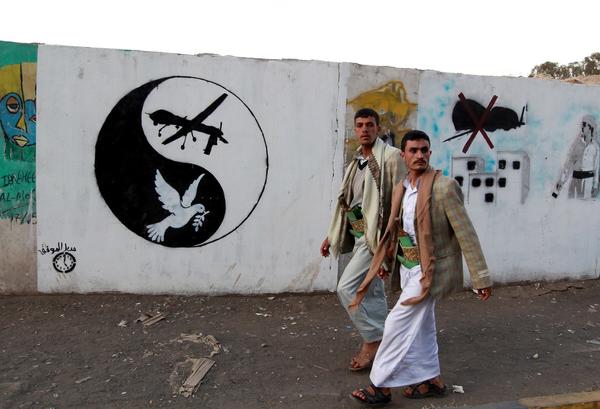In Yemen, US Drone Strikes Continue to Take Civilian Lives

Yemeni human rights organization Mwatana for Human Rights has published a new report documenting how civilian lives are being harmed by the war in Yemen, including through US drone strikes. The report, titled ‘Withering Life: The Human Rights Situation in Yemen 2018‘ is based on over 2000 interviews with “victims, relatives, eyewitnesses, and medical and humanitarian workers” as well as site visits and inspections of weapons remnants.
Though the Trump administration is notoriously secretive about drone strikes, Mwatana’s extensive field research shows that US drone strikes in 2018 alone killed 22 people, including three children. Only one of those killed appeared to be affiliated with Al Qaeda. Mwatana has also previously worked together with EFAD member PAX, documenting how US drone strikes violated human rights with case studies from drone strike victims in Yemen.
The US, however, claimed that all of the 36 drone strikes it reportedly carried out in 2018 targeted terrorist groups in Yemen, and that none of them had led to the deaths of civilians. A similar posture was maintained by the US on drone strikes in Somalia, where the US denied the existence of civilian casualties until Amnesty International published field research documenting otherwise, after which the US acknowledged some innocent lives were taken by their drone strikes.
Yemen was the site of the second reported US drone strike, and hence present at the outset of the US targeted killing program. Under the Trump administration, restraints on drone strikes in the country were loosened, increasing the risk of more innocent deaths. The Bureau of Investigative Journalism has recorded up to 225 innocent lives lost, 50 of whom were children, as a direct result of the US drone program since it began.
Mwatana‘s findings show that families and children continue to be targeted by drone strikes, and serve as a stark reminder that the US drone program continues to undermine international law on the use of force. It remains crucial for other states to explicitly reject the use of armed drones in this way, to engage in international discussions on these issues, and to put clear policies in place that prevent illegal targeted killings.

